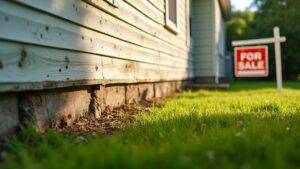Mold is a common issue that homeowners face when selling a house. Even small patches can worry buyers and hurt your chances of a smooth sale. Many wonder if fixing the problem before listing is worth the effort.
If you ignore mold, buyers may back out or offer less money. Mold can cause health concerns and make your home fail inspection. You could end up with delayed deals and extra stress.
Yes, you should remediate mold before selling your home. Taking care of the problem can help you get better offers and close faster.
Mold remediation shows buyers you are responsible and care about their safety. This blog will guide you through the steps to handle mold before selling your home.
Key Takeaways
- Remediating mold before selling increases your home’s appeal, value, and buyer confidence.
- Virginia law and many states require disclosure of known mold, making remediation and documentation important for legal compliance.
- Visible mold or unresolved issues often lead to lower offers, buyer hesitation, or failed sales.
- Professional remediation and clear documentation can expedite sales and reduce negotiation problems.
- Proactive mold removal prevents inspection failures and signals proper maintenance to potential buyers.
Understanding What Mold Is and Why It Matters
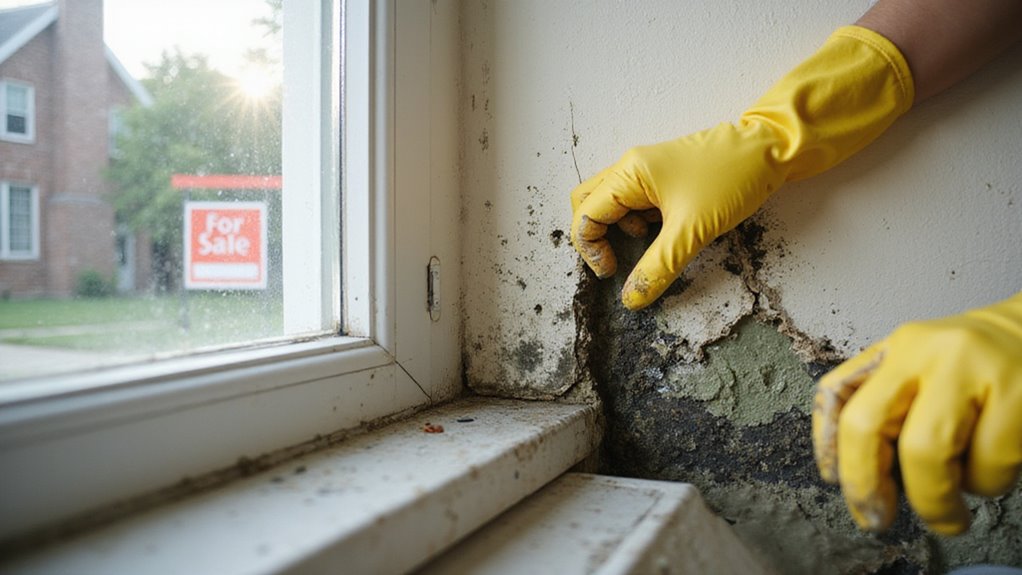
Mold is a type of fungus that grows in damp places. It is important because it can signal water problems in a home. If buyers see mold, they may worry about bigger issues.
Homeowners should take mold seriously when selling. Mold is not just about looks; it can lower your home’s value. If mold is present, buyers might offer less or even walk away.
Mold testing and detection should happen before listing your home. If you find mold early, you can fix the problem and avoid surprises later. This helps make your home more attractive to buyers.
If you skip mold checks, your home could fail inspection. That could delay the sale or hurt your final price. Fixing mold issues in advance gives buyers more confidence.
In Virginia, sellers are legally required to disclose known mold or water damage, and failing to do so can lead to legal trouble and penalties.
Common Causes of Mold in Homes
You’ll often find mold thriving in homes with poor ventilation or unnoticed plumbing leaks. When air can’t circulate or moisture accumulates from drips, you’re creating an ideal environment for growth. Addressing these issues quickly protects your property’s value and appeal to potential buyers.
Mold and other environmental factors can significantly impact a home’s sale speed and should be addressed to help ensure a faster and more successful sale. Taking proactive steps, such as property inspection & repairs, can further reassure buyers and prevent costly surprises during the transaction process.
Poor Ventilation Issues
Poor ventilation causes moisture to build up in homes. This can lead to mold growth, which is a serious problem. Mold can make selling your home harder.
Bathrooms, kitchens, and basements often have higher humidity. If these spaces lack exhaust fans or working windows, moisture gets trapped. Mold spores can then spread easily.
Mold damages walls and ceilings and may scare off buyers. Home inspections will likely find mold, which can lower your home’s value. If you address ventilation issues, you can reduce these risks.
Install or upgrade exhaust fans to improve airflow. Open windows when possible and use dehumidifiers to control moisture. These steps can help protect your home before you sell.
Plumbing Leaks and Drips
Plumbing leaks and drips can lead to mold growth in hidden areas of your home. Mold often forms behind walls, under sinks, and near fixtures if leaks are not fixed. Addressing leaks early can prevent bigger problems when selling your home.
Buyers and inspectors look for signs of mold or water damage. If leaks are left unchecked, mold can lower your property value. Prompt repairs help protect your investment.
Leaks under sinks can go unnoticed and allow mold to grow for months. Dripping pipes or faucets raise humidity and help mold spread. If you suspect a hidden leak, a professional inspection may be needed.
Moisture control is important for preventing mold. Sealing joints and fixing leaks quickly can stop problems before they start. Taking action now helps avoid costly repairs later.
Health Risks Associated With Mold Exposure

When mold is present in your home, you’re putting buyers at risk for respiratory problems and triggering allergic reactions or sensitivities. Even brief exposure can cause coughing, wheezing, or skin irritation, especially in sensitive individuals. Addressing these issues before listing your property protects both your investment and prospective occupants’ health.
Since buyers prioritize home presentation and safety, remediating mold can help facilitate a faster and smoother sale process. In Virginia, sellers must be aware of legal disclosure requirements, which can include the obligation to inform buyers of known mold problems and provide documentation to minimize legal and financial risks.
Respiratory Issues From Mold
Mold can cause breathing problems for people living in or visiting your home. Mold spores lower air quality and can make it hard to breathe. If someone has asthma or allergies, mold can worsen their symptoms.
People may experience coughing, throat irritation, or frequent wheezing when mold is present. Chronic exposure increases the risk of long-term respiratory illness. Sensitive individuals could find it difficult to stay in the affected property.
Professional mold testing is important before putting your home on the market. If mold is found, buyers might lose confidence in the safety of your property. Early detection helps protect your investment and keeps everyone healthier.
Allergic Reactions and Sensitivities
Mold exposure can cause allergic reactions and sensitivities in many people. Common symptoms include sneezing, itchy eyes, and skin rashes. These issues can make your home less appealing to buyers.
If buyers or inspectors see mold, they may worry about the home’s air quality and safety. A home inspection could highlight these concerns and lower the value of your home. Serious allergy risks may even cause buyers to withdraw their offers.
The table below shows how allergy symptoms can affect buyer opinions:
| Allergy Symptom | Buyer Concern |
|---|---|
| Sneezing/Runny Nose | Doubts about air quality |
| Itchy Eyes/Skin | Concerns about health |
| Asthma Flare-ups | Worries for families |
| Headaches/Fatigue | Worries about long-term comfort |
If you address mold and allergy risks early, you can protect your home sale. Proper cleaning and prevention help avoid problems during the selling process.
How Mold Impacts Your Home’s Value
Mold can lower your home’s value because buyers and appraisers see it as a serious problem. Mold shows there could be hidden damage or poor maintenance. If mold is present, your home can be harder to sell and might get lower offers.
Buyers may lose trust in the property and worry about health risks. Even if your home looks nice, mold can scare people away. Appraisers might lower your home’s value to account for cleanup and repairs. If lien history is also an issue alongside mold, it can further complicate the sale and decrease your bargaining power.
If you have visible mold, your upgrades and landscaping won’t matter as much. You may have fewer interested buyers and less room to negotiate. Addressing mold early can help protect your investment and make selling easier.
If you fix mold problems before selling, you can keep your home’s value higher. Proactive measures show buyers you care for your home. This can lead to smoother and faster sales. Taking care of mold promptly also helps you avoid potential disclosure requirements that could lead to legal trouble during the sale.
Legal Disclosure Requirements for Mold
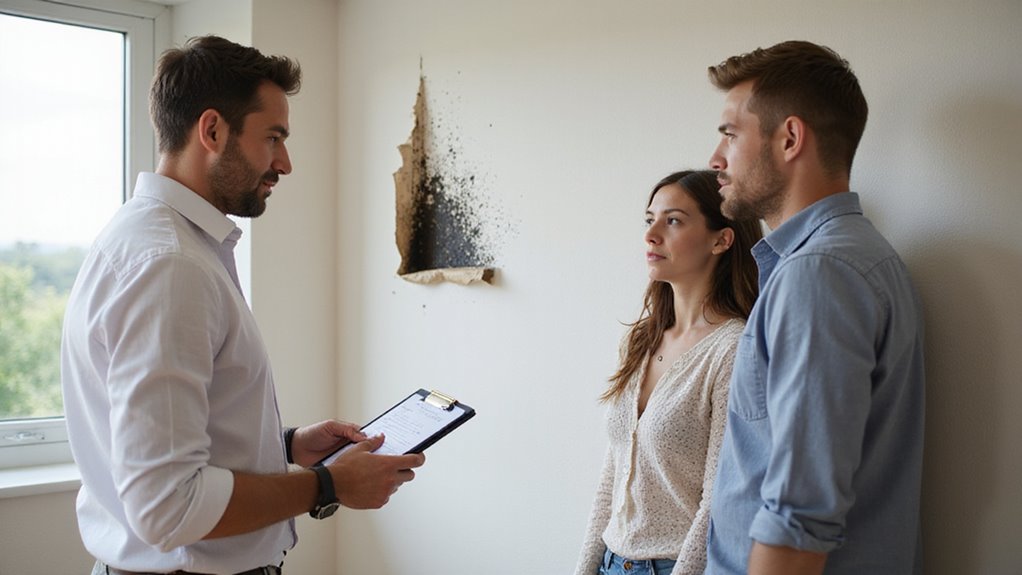
You need to understand your state and local laws regarding mold disclosure when selling your home. Most jurisdictions require sellers to inform buyers about any known mold issues, and failing to do so can lead to legal consequences. Protect your sale by making sure you meet all disclosure obligations accurately and on time.
Before listing, take the time to research regional demand to further understand how mold disclosures might impact your ability to quickly and successfully sell your property. When selling a property in Virginia, you should also be aware of your legal compliance obligations regarding title and estate issues, as these can overlap with mold disclosure in situations involving probate or disputed ownership.
State and Local Laws
Mold disclosure is important when selling your home because many state and local laws require it. These laws set rules for reporting mold, which can affect your sale. If you do not follow them, you may face delays or legal trouble.
Some places require you to give written notice about any known mold, no matter how small. Certain states may ask for a mold inspection or certification before the sale. Local rules can also affect how you fix mold problems.
Buyers and real estate agents often check if you have followed these rules. Proper paperwork makes your home easier to sell. If you research local laws before listing, you can avoid problems and protect yourself.
Seller Disclosure Obligations
Seller disclosure laws require you to share any known mold problems in your home. You must report mold presence, past issues, or cleanup steps taken. Not disclosing this information could lead to legal and financial trouble.
Buyers expect clear details about mold so they can make good choices. If you address mold and explain how you prevent it, your home may be more attractive. Always keep and share records of inspections and repairs related to mold.
If you are honest and provide full details, you lower your risk of future problems. Proper disclosure helps you build trust with buyers. This approach can also help your property stand out in the market.
Buyer Perceptions and Concerns About Mold
Mold problems can lower a home’s value and make it harder to sell. Buyers often worry about mold, even in small amounts. They see mold as a sign of possible bigger problems. Many buyers also consider how market perception and buyer hesitation can affect the desirability of a home with visible mold.
Inspection reports showing mold may cause buyers to negotiate for a lower price. Some buyers might ask for repairs to fix the issue before buying. If buyers are very concerned about health, they may decide not to buy at all.
Mold concerns also make buyers think about hidden water damage. Structural problems linked to moisture are a common fear. Buyers want to avoid future costs for fixing these problems.
Some sellers choose to work with companies that purchase houses as-is to avoid the hassle and expense of mold remediation before selling.
The Mold Remediation Process Explained
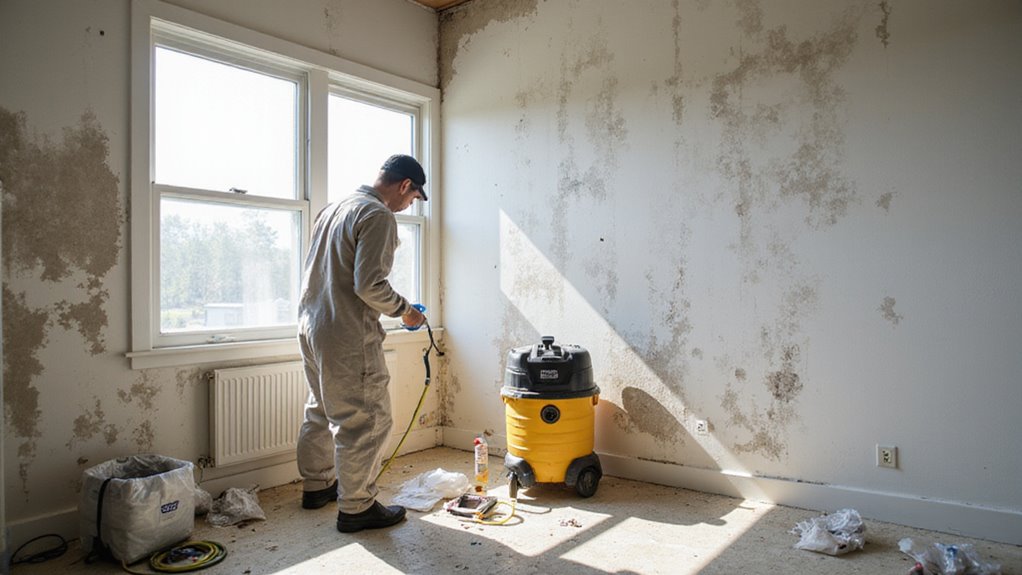
The mold remediation process removes mold to make your home safe and clean. Professionals start by testing to find the type and amount of mold. This step helps them know exactly where the problem is.
Specialists may block off affected areas and use HEPA filters to trap mold spores. They remove any damaged materials and clean surfaces with special solutions. If hidden mold is found, experts treat those spots as well. Taking care of obvious issues like mold demonstrates home care and can speed up the sale process.
Air quality is checked during and after the process to make sure mold is gone. Proper steps help stop mold from coming back. If you document the process, buyers can see you handled the issue responsibly.
Addressing buyer concerns about mold through documentation and remediation can support a more successful home sale, especially when transparency is important to building trust.
Costs Involved in Mold Remediation
Mold remediation can cost a lot, depending on your situation. Property size, mold type, and damage all affect the price. It is important to know these costs before selling your home. Many sellers in Stuarts Draft, VA take advantage of services that buy houses as-is to avoid the cost and hassle of mold remediation.
Mold testing is usually the first step and may be required by buyers or inspectors. Remediation costs include labor, materials, and equipment. You might also need to repair walls, floors, or ceilings after mold is removed.
If the work is done, post-remediation testing ensures the mold is gone. Knowing these costs helps you plan and negotiate a fair deal. If you budget for these expenses, you can avoid surprises later.
Often, sellers compare these costs to nearby renovated and as-is home prices to help decide whether remediation or selling as-is makes more financial sense.
Weighing the Benefits of Remediating Before Selling
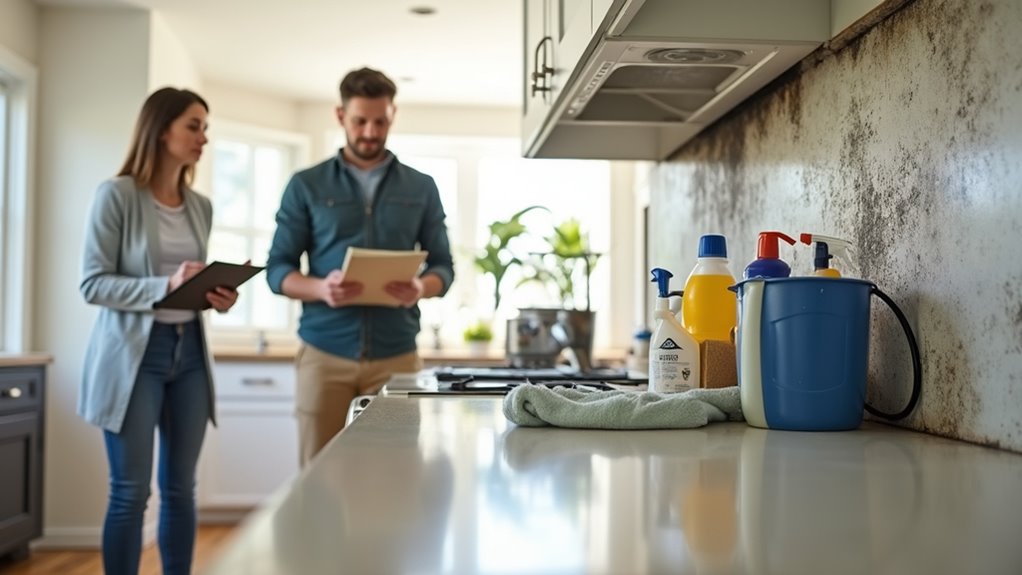
Remediating mold before selling your home can make the sale process smoother and more profitable. Fixing the problem early gives you a stronger position when negotiating with buyers. Clean homes with no mold issues often attract more serious buyers.
Mold testing gives you proof that your home is safe and healthy. Removing mold also helps your home look and smell better during showings. If inspections find no mold, the sale can move faster with fewer price cuts.
You can use indoor plants to show your home is a healthy place to live. Buyers who care about air quality may find this appealing. If you highlight these features, your home may stand out in the market.
Potential Downsides to Remediation Before Listing
Remediating mold before listing your home has some downsides. The process can bring delays and extra costs. These issues may affect your selling plans and final profit.
Remediation expenses can be high and might not increase your sale price. Visible repairs could make buyers worry or ask for more inspections. Some buyers may hesitate if they doubt the home’s long-term condition.
If buyers think repairs were large, they may offer less money. Cost concerns can cause tougher negotiations, even if repairs were minor. These factors can make selling your home more challenging.
Selling a Home “As-Is” With Mold Issues
When you sell your home “as-is” with mold issues, you must comply with strict legal disclosure requirements to avoid future liability. Buyers will factor mold into their perception of the property, often leading to reduced interest or lower offers. You’ll need to price accordingly and prepare for more challenging negotiations.
Legal Disclosure Requirements
If you sell your home “as-is” and know about mold, you usually must tell buyers. State and local laws often require this. You cannot skip these rules.
You should share any reports or documents about mold in your home. This may include mold inspection or environmental testing results. Always give clear and complete information.
If you have not fixed the mold, you still need to report what you know. Describe where the mold is and how much there is. Make sure you follow all local and state disclosure laws.
If you do not follow these rules, you could lose the sale or face legal trouble. Meeting disclosure laws protects you. It also helps the selling process go more smoothly.
Buyer Perception Impact
Full disclosure about mold shapes how buyers see your property. Buyers often become cautious if they know there is mold. If you list a home with mold, buyers may hesitate to make an offer.
Buyers worry about health problems linked to mold. They may also fear extra costs for repairs. These concerns can make them less confident in your property.
If buyers see signs of poor maintenance, they may think other issues exist. They will likely question if you took care of the home. Unresolved mold problems often act as a warning sign for buyers.
If buyers have doubts, they may walk away or offer less. Mold can reduce the number of interested buyers. If you want a quick sale, addressing mold is important.
Pricing and Negotiation
Selling a home “as-is” with mold usually means you will get less money. Buyers lower their offers to cover possible repairs. If you do not fix the mold, expect a drop in your final price.
Most buyers will ask for a bigger discount than the actual cost of mold removal. Lenders may refuse to finance homes with visible mold problems. If you cannot fix the mold, be ready for fewer interested buyers.
Mold insurance or warranties can help attract buyers who worry about risk. These options may help but will not erase all buyer concerns. If you offer them, do not expect to keep your asking price.
Providing clear inspection reports and honest disclosures helps you explain your pricing. If you are transparent, buyers may trust you more. This can make negotiations easier, even if your price is lower.
Negotiating With Buyers Over Mold Concerns
Buyers may worry about mold even after you fix the problem. You should show proof of professional mold testing and completed repairs. This helps build trust and shows you are honest about the issue.
Providing proof of mold testing and repairs reassures buyers and demonstrates your honesty about past issues with the home.
If you made home improvements, explain what you did. For example, mention better ventilation or moisture control. These upgrades can make buyers feel safer.
If buyers ask for more, consider fair options. You might offer a home warranty or lower the price. Staying flexible can help close the deal.
Clear communication is important if you want to ease buyer concerns. Good records and honesty can help you sell your home, even with mold history.
Working With Real Estate Agents on Mold Problems
Working with a real estate agent can make selling a home with mold problems easier. An agent knows how to follow local rules and handle mold issues. If you have mold, the agent will help you understand what to do next.
Agents can explain inspection results to you and to buyers. They will suggest ways to fix mold that fit your budget. If you need repairs, your agent can recommend trusted contractors or inspectors.
Disclosure laws are important when selling a house with mold history. Your agent will help you share mold information with buyers honestly. If you follow their advice, you can avoid common problems during negotiations.
Tips for Preventing Mold Before Listing Your Home
To prevent mold before listing your home, take simple steps to keep it dry and clean. Mold can lower your property value and worry buyers. A clean, mold-free house is more attractive to buyers.
If you have leaks or moisture, fix them right away. Damp areas help mold grow quickly. A professional mold inspection can catch hidden problems early.
Dehumidifiers work well in humid rooms like basements. Proper ventilation in bathrooms and kitchens also helps control moisture. Clean gutters and downspouts often to keep water away from your house.
Dehumidifiers, good ventilation, and clean gutters help keep moisture under control and protect your home from mold.
Cracked caulk or broken seals around windows and doors should be repaired. If you see condensation on windows or pipes, add insulation. Regular checks can prevent small problems from becoming big ones.
If you follow these steps, your home will look well cared for. Buyers will feel more confident and may offer a better price.
Conclusion
If you remediate mold before selling, you help protect your home’s value and reputation. Mold removal can prevent legal issues and build trust with buyers. Addressing problems early keeps the selling process smooth and stress-free.
If you prefer a quick sale, we buy houses for cash in any condition. You do not have to worry about repairs or cleanup. This option saves you time and effort.
If you are ready to sell, let us help. We at Align Real Estate Solutions make the process easy and hassle-free. Contact us today to get started.
Author
-

Zach Koops is co-founder and Real Estate Success Manager at Align Real Estate Solutions, serving homeowners across Virginia since 2024. With a passion for real estate and a heart for people, Zach has built his career around helping sellers navigate tough situations—foreclosure, inheritance, relocation, repair-overload—with clarity and compassion. He’s known for being straightforward, steady under pressure, and deeply invested in relationships. Outside of work, he spends his time as a husband and father, enjoys the outdoors in Shenandoah Valley, loves singing on stage, and constantly seeks growth through reading and new experiences.






